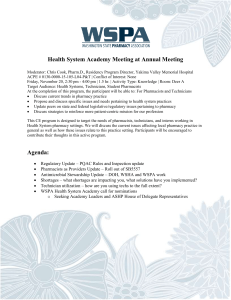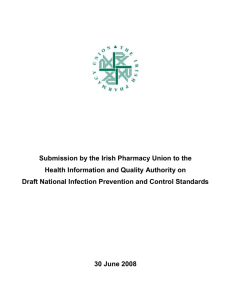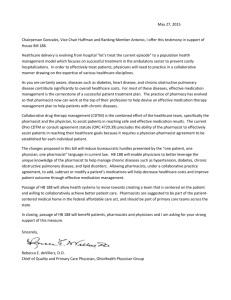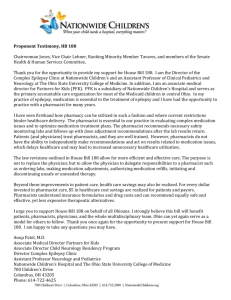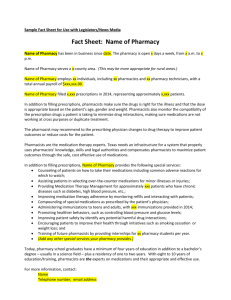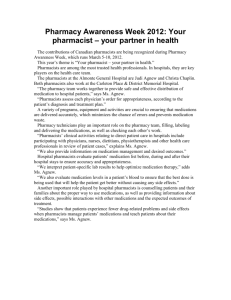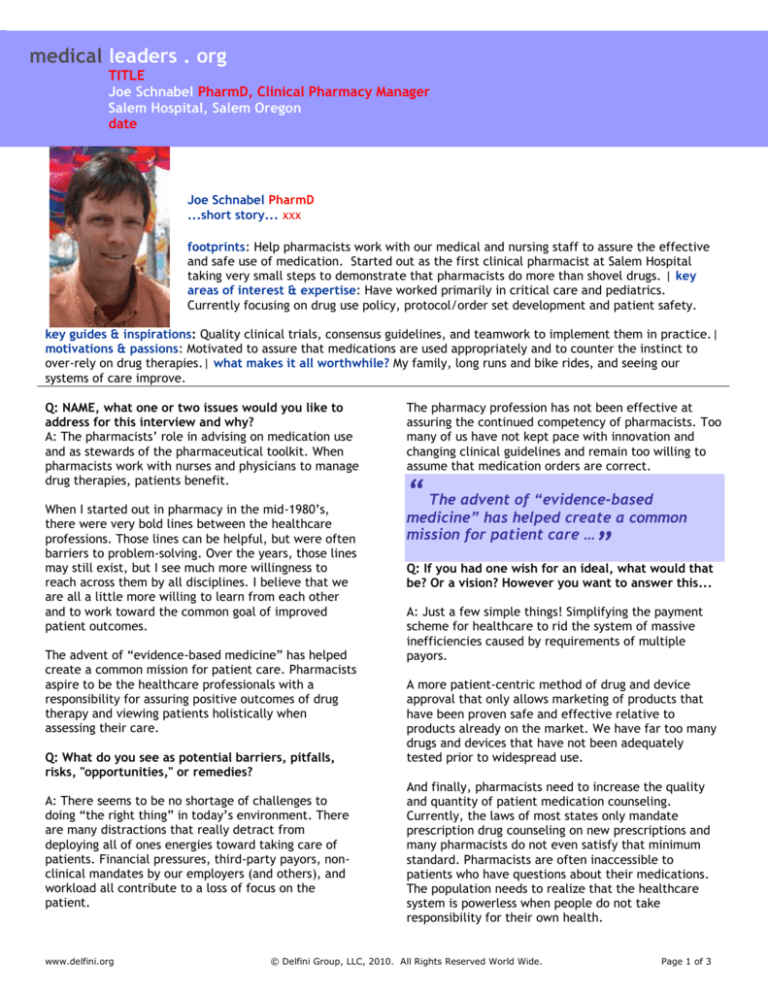
medical leaders . org
TITLE
Joe Schnabel PharmD, Clinical Pharmacy Manager
Salem Hospital, Salem Oregon
date
Joe Schnabel PharmD
...short story... xxx
footprints: Help pharmacists work with our medical and nursing staff to assure the effective
and safe use of medication. Started out as the first clinical pharmacist at Salem Hospital
taking very small steps to demonstrate that pharmacists do more than shovel drugs. | key
areas of interest & expertise: Have worked primarily in critical care and pediatrics.
Currently focusing on drug use policy, protocol/order set development and patient safety.
key guides & inspirations: Quality clinical trials, consensus guidelines, and teamwork to implement them in practice.|
motivations & passions: Motivated to assure that medications are used appropriately and to counter the instinct to
over-rely on drug therapies.| what makes it all worthwhile? My family, long runs and bike rides, and seeing our
systems of care improve.
Q: NAME, what one or two issues would you like to
address for this interview and why?
A: The pharmacists’ role in advising on medication use
and as stewards of the pharmaceutical toolkit. When
pharmacists work with nurses and physicians to manage
drug therapies, patients benefit.
The pharmacy profession has not been effective at
assuring the continued competency of pharmacists. Too
many of us have not kept pace with innovation and
changing clinical guidelines and remain too willing to
assume that medication orders are correct.
When I started out in pharmacy in the mid-1980’s,
there were very bold lines between the healthcare
professions. Those lines can be helpful, but were often
barriers to problem-solving. Over the years, those lines
may still exist, but I see much more willingness to
reach across them by all disciplines. I believe that we
are all a little more willing to learn from each other
and to work toward the common goal of improved
patient outcomes.
medicine” has helped create a common
mission for patient care …
The advent of “evidence-based medicine” has helped
create a common mission for patient care. Pharmacists
aspire to be the healthcare professionals with a
responsibility for assuring positive outcomes of drug
therapy and viewing patients holistically when
assessing their care.
Q: What do you see as potential barriers, pitfalls,
risks, "opportunities," or remedies?
A: There seems to be no shortage of challenges to
doing “the right thing” in today’s environment. There
are many distractions that really detract from
deploying all of ones energies toward taking care of
patients. Financial pressures, third-party payors, nonclinical mandates by our employers (and others), and
workload all contribute to a loss of focus on the
patient.
www.delfini.org
“ The advent of “evidence-based
”
Q: If you had one wish for an ideal, what would that
be? Or a vision? However you want to answer this...
A: Just a few simple things! Simplifying the payment
scheme for healthcare to rid the system of massive
inefficiencies caused by requirements of multiple
payors.
A more patient-centric method of drug and device
approval that only allows marketing of products that
have been proven safe and effective relative to
products already on the market. We have far too many
drugs and devices that have not been adequately
tested prior to widespread use.
And finally, pharmacists need to increase the quality
and quantity of patient medication counseling.
Currently, the laws of most states only mandate
prescription drug counseling on new prescriptions and
many pharmacists do not even satisfy that minimum
standard. Pharmacists are often inaccessible to
patients who have questions about their medications.
The population needs to realize that the healthcare
system is powerless when people do not take
responsibility for their own health.
© Delfini Group, LLC, 2010. All Rights Reserved World Wide.
Page 1 of 3
medical leaders . org
TITLE
Joe Schnabel PharmD, Clinical Pharmacy Manager
Salem Hospital, Salem Oregon
date
Q: What would it take for that to happen?
A: Universal healthcare coverage, front-line healthcare
professionals setting practice standards in the
workplace, reform of the FDA drug approval and postmarketing surveillance processes, and a commitment
by pharmacists to talk to every patient every time they
pick up a prescription—even if it is just to say “hello.”
Society needs to incentivize healthy behaviors and
communities in all aspects of policy-making.
Q: What do you see as potentially helping medical
leaders and others with what you've selected to
address?
A: It seems that the pace of healthcare is increasing in
an effort to improve efficiency. To the extent that this
can be done safely, it is a necessary and positive trend.
There seem to be more and more non-clinicians pushing
“efficiency” before systems are in place to allow it to
happen safely. Clinicians need to be forceful in their
patient advocacy to assure that healthcare needs are
met in the most beneficial way possible.
Q: Do you have favored resources for any groups on
the topics you are addressing?
A: Atul Gawande’s “The Checklist Manifesto” finally
articulated what I have felt was missing in the
healthcare system as I knew it. We have been willing to
allow variability in the system so as not to “upset”
physicians practicing the “art” of medicine. Over the
past several years, there has been a steady move
toward standardization and implementation of bestpractices that is resulting in safer and more efficient
systems. Although many ideas in healthcare are being
borrowed from the manufacturing sector, I do not
believe that healthcare lends itself completely to the
manufacturing model. We are not making Toyotas, but
dealing with the real problems of real people in real
time. We may have plenty to learn from manufacturing
processes, but we must be careful to not to take that
analogy too far.
A: Atul Gawande, Uwe Reinhart, Don Berwick, Howard
Cohen (and his unrelated kindred spirit, Michael Cohen
(ISMP))
Q: Do you have a favorite story for us?
A: As a brand new graduate intern, I received an order
for gentamicin “80 mg q8h” for a patient with renal
failure. I knew this to be a bad idea, so I called the
doctor with a recommendation to change the dose to
one that accounts for the patient’s poor renal function.
When I got off of the phone, I noticed that the
pharmacist I was working with was looking at me
quizzically. She asked why I called the doctor, so I
explained that the dose was not correct and he needed
to know that. The pharmacist seemed amused and a
little shocked by my call since that was not the norm.
To me, this was the beginning of the end of accepting
any but the most blatantly incorrect medication orders
that came our way.
Q: And almost lastly, the best medicine is to be
happy, yes? What's your favored flavor-of-themoment to make you or any of us more happy? Toss
us a little tidbit from your medicine cabinet, please.
A: I really try not to bring work home with me. Getting
outside as much as possible and not being stopped by a
little wind, rain, or cold is how I like to decompress
after a long day. Running with friends and spending
time with my wife and four daughters makes me happy.
My medicine cabinet is empty except for the occasional
naproxen sodium 220 mg!
Q: Now tell us something fun about you?
A: Fun? Hmmm… I’m not so sure that these are fun for
everyone, but I love to bike and have ridden the Pacific
coast from Northern Oregon to Los Angeles. I have
completed an Ironman triathlon and will never do
another one! My wife “encourages” me run more
marathons than I would like, but they are often fun to
look back on.
Q: Do you have other general favored resources?
Medical or otherwise?
A: NEJM, Cochrane Reviews, Guidelines.gov, Medical
Letter, Google Earth, How to Cook Anything (Bitman)
Q: Any <medical leaders . org> interview candidates
that you'd like to hear from?
www.delfini.org
“ XXX…
”
XXX
© Delfini Group, LLC, 2010. All Rights Reserved World Wide.
Page 2 of 3
medical leaders . org
TITLE
Joe Schnabel PharmD, Clinical Pharmacy Manager
Salem Hospital, Salem Oregon
date
“ XXX…
”
XXX
www.delfini.org
© Delfini Group, LLC, 2010. All Rights Reserved World Wide.
Page 3 of 3

